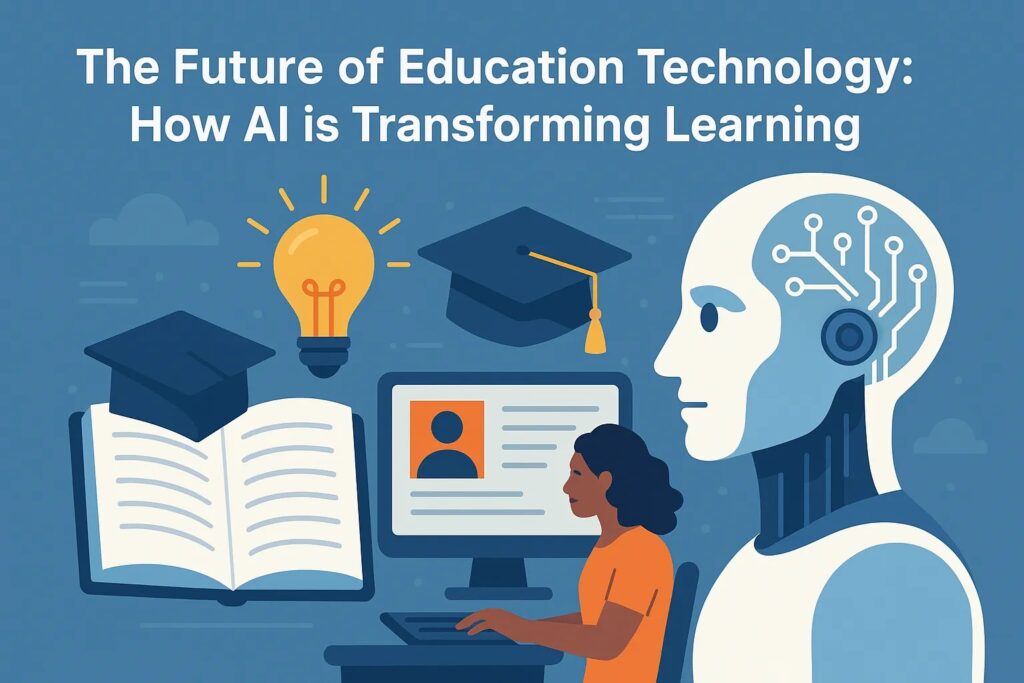Introduction
The education sector is undergoing a seismic shift, driven by rapid advancements in artificial intelligence (AI) and educational technology (EdTech). By 2025, AI-powered learning is expected to dominate classrooms, online courses, and corporate training programs, offering personalized, efficient, and scalable education solutions.
This article explores how AI is transforming global education, the key trends shaping EdTech in 2025, and what students, educators, and institutions should expect in this new era.
1. The Current State of AI in Education
AI is no longer a futuristic concept—it’s already embedded in modern education. Key applications include:
- Personalized Learning: AI algorithms analyze student performance to tailor lessons, pacing, and content.
- Automated Grading: AI-powered tools like Gradescope reduce teacher workload by assessing assignments and exams.
- Chatbots & Virtual Tutors: Platforms like ChatGPT and Khan Academy’s AI tutor provide instant academic support.
- Predictive Analytics: Schools use AI to identify at-risk students and intervene early.
By 2025, these technologies will become even more sophisticated, making education more adaptive and accessible.
2. Key AI-Powered EdTech Trends in 2025
A. Hyper-Personalized Learning Experiences
AI will enable fully customized education paths, adjusting content based on a student’s strengths, weaknesses, and learning style. Expect:
- AI-generated study plans
- Real-time feedback on essays and problem-solving
- Dynamic course recommendations
B. AI-Driven Language Learning & Global Accessibility
Language barriers are shrinking thanks to AI-powered translation and speech recognition. Tools like Duolingo Max (powered by GPT-4) and Google’s AI language tutors will make multilingual education seamless.
C. Virtual & Augmented Reality (VR/AR) in Classrooms
By 2025, VR labs and AR simulations will be common in STEM education, medical training, and vocational programs. AI will enhance these experiences by:
- Generating interactive 3D models
- Simulating real-world scenarios (e.g., virtual dissections, engineering projects)
D. AI in Admissions & Scholarship Matching
Universities are adopting AI to:
- Analyze applicant profiles for better-fit admissions
- Match students with scholarships using predictive algorithms
- Detect fraudulent applications through AI-powered verification
E. Ethical AI & Data Privacy Concerns
As AI becomes more prevalent, debates around data security, algorithmic bias, and digital equity will intensify. Governments and institutions must establish AI ethics guidelines to ensure fairness.
3. The Future of Online Education & AI Universities
By 2025, we may see the first fully AI-powered universities, offering:
- Self-paced degree programs
- AI professors delivering lectures
- Automated career counseling
Platforms like Coursera, Udacity, and edX will integrate deeper AI functionalities, making online degrees more credible and interactive.
4. Challenges & Considerations
Despite its potential, AI in education faces hurdles:
- Digital Divide: Not all students have equal access to AI tools.
- Job Displacement: Will AI replace human teachers? (Unlikely—but roles will evolve.)
- Over-Reliance on Technology: Balancing AI with human interaction remains crucial.
5. How to Prepare for an AI-Dominated Education System
- For Students: Embrace AI tools but develop critical thinking skills.
- For Educators: Upskill in EdTech to stay relevant.
- For Institutions: Invest in AI infrastructure and teacher training.
Conclusion
AI-powered learning is set to revolutionize education by 2025, making it more personalized, efficient, and globally accessible. While challenges remain, the benefits—such as adaptive learning, automated administration, and immersive experiences—far outweigh the risks.


